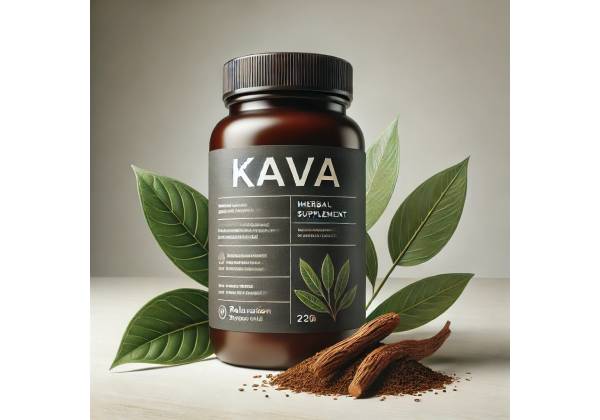What is kava?
Kava, scientifically known as Piper methysticum, is a tropical plant from the South Pacific Islands. For centuries, kava has been used in traditional ceremonies and as a natural remedy for its calming and mood-enhancing effects. Kava is revered in Pacific cultures for its spiritual significance, as well as its ability to reduce anxiety, promote relaxation, and improve mental clarity. Traditionally, the root of the kava plant is made into a drink that is consumed at social and ceremonial gatherings to promote feelings of calm and well-being.
Kava has gained global recognition for its ability to improve mental health, particularly by reducing symptoms of anxiety, stress, and mild depression. The active compounds in kava, known as kavalactones, interact with various neurotransmitter systems in the brain, influencing mood, anxiety, and relaxation. Because of its non-addictive and relatively safe profile, kava has emerged as a viable alternative to pharmaceutical treatments for anxiety and stress disorders. Kava is becoming more widely recognized as a valuable natural remedy for improving psychiatric and mental health as scientific research into its therapeutic potential advances.
How Kava’s Unique Compounds Support Mental Health
The unique biochemical composition of kava accounts for its mental health benefits. The primary active components of kava are a class of compounds known as kavalactones, which are responsible for its anxiolytic, sedative, and mood-enhancing properties. Kavalactones account for up to 20% of the plant’s dry weight and are primarily concentrated in the kava root.
Kavalactones
The six major kavalactones found in kava are kavain, dihydrokavain, methysticin, dihydromethysticin, yangonin, and desmethoxyyangonin. These kavalactones act synergistically on the central nervous system, promoting relaxation without causing cognitive impairment or loss of motor function. Kavain, in particular, has been extensively studied and is thought to play a key role in kava’s calming and anxiolytic properties. It influences neurotransmitter activity, particularly gamma-aminobutyric acid (GABA) receptors, which are known to reduce anxiety and promote relaxation.
Kavain and dihydrokavain, two of the most abundant kavalactones, have mild analgesic properties and have been shown to reduce muscle tension, which adds to the physical sensation of relaxation. Yangonin can bind to cannabinoid receptors in the brain, suggesting that kava may also interact with the body’s endocannabinoid system, which regulates mood and emotional balance.
Flavonoids & Alkaloids
In addition to kavalactones, kava contains flavonoids and alkaloids, but in smaller amounts. These compounds help to improve the plant’s overall health by acting as an antioxidant and anti-inflammatory. While they are not directly involved in the regulation of mental health, their ability to reduce inflammation and oxidative stress may benefit brain health over time.
Mechanism of Action
The most important way kava affects mental health is through its interaction with GABA receptors. GABA is the brain’s primary inhibitory neurotransmitter, which reduces neuronal excitability and promotes a calming effect. Kava’s kavalactones increase GABA receptor activity, which reduces anxiety, stress, and improves emotional regulation. Importantly, unlike some sedatives, kava does not impair cognitive function, allowing people to maintain mental clarity while experiencing its relaxing effects.
Furthermore, some kavalactones, such as yangonin, can bind to dopamine receptors, potentially promoting mood elevation and contributing to kava’s ability to alleviate symptoms of mild depression. Kava’s interaction with both the GABA and dopamine systems suggests that it takes a multifaceted approach to promoting mental and emotional health.
How Kava’s Mechanisms Support Stress Reduction and Emotional Balance
Kava has gained widespread recognition for its ability to improve mental health due to its profound effects on anxiety, stress, and mood disorders. Its ability to modulate neurotransmitter systems and provide natural anxiolytic and calming effects makes it an important supplement for people looking for natural alternatives to pharmaceutical treatments for mental health issues. Below, we look at the primary mechanisms by which kava provides mental health benefits and how these translate into improvements in psychiatric well-being.
Anxiety Relief and Stress Reduction
Kava’s most well-documented benefit is its ability to alleviate anxiety. This effect is largely due to its interaction with the GABAergic system. By binding to GABA receptors, kava increases inhibitory signals in the brain, resulting in reduced neuronal excitability and a calming, tranquilizing effect. This makes kava an effective natural treatment for generalized anxiety disorder (GAD) and other types of anxiety, such as social anxiety and situational stress.
Numerous clinical studies have shown that kava is effective in treating anxiety. In a double-blind, placebo-controlled trial published in Psychopharmacology, kava extract significantly reduced anxiety symptoms in participants with GAD, with fewer side effects than pharmaceutical anxiolytics such as benzodiazepines. Unlike benzodiazepines, which can be addictive and impair cognitive function, kava has a calming effect without sedating or causing dependence, making it a safer long-term option.
Kava’s stress-relieving properties are also associated with its ability to lower cortisol levels. Cortisol is the body’s primary stress hormone, and chronically elevated levels can lead to mental health problems like anxiety, depression, and cognitive decline. Kava improves stress management and emotional balance by lowering cortisol levels and promoting relaxation.
Managing Depression and Mood Disorders
While kava is best known for its anxiolytic properties, it has also shown promise in treating symptoms of mild depression and mood disorders. Some kavalactones, including yangonin, have been shown to interact with the brain’s dopamine receptors. Dopamine is a neurotransmitter that controls mood, motivation, and the reward system. Kava, by increasing dopamine signaling, may help to alleviate depression symptoms such as low mood, apathy, and anhedonia (the inability to feel pleasure).
Though kava is not commonly used as a primary treatment for major depressive disorder (MDD), its mood-enhancing properties make it an effective supplement for people suffering from mild to moderate depression, especially when symptoms are associated with stress or anxiety. Furthermore, the calming effects of kava may help alleviate the physical tension and restlessness that are common during depressive episodes, promoting a better sense of well-being.
Improving Sleep Quality and Relaxation
Many people who experience anxiety and stress also have sleep problems, such as insomnia or difficulty falling asleep. Kava has been shown to improve sleep quality by encouraging relaxation and lowering mental and physical stress. Its ability to increase GABA activity helps to calm the mind, making it easier to fall asleep and maintain restful sleep all night.
According to Phytotherapy Research, participants who took kava experienced improvements in both sleep latency (the time it takes to fall asleep) and overall sleep quality. Kava’s mild sedative effects are beneficial for people who suffer from anxiety-induced insomnia or have difficulty calming their minds before going to bed. Importantly, kava does not cause the morning grogginess or cognitive impairment that are commonly associated with pharmaceutical sleep aids, allowing people to wake up feeling refreshed.
Aiding Cognitive Function and Mental Clarity
Unlike many sedative or anxiolytic treatments, which can impair cognitive function, kava has the unique ability to promote relaxation while maintaining mental clarity. This makes it especially useful for people who need to manage stress and anxiety while staying focused and productive, such as at work or school.
Kava’s ability to reduce physical tension and calm the mind while maintaining cognition can improve mental clarity and focus. In fact, some users report that kava improves their concentration and mental performance by reducing anxiety and stress, allowing for clearer thinking and better decision-making. This makes kava an effective supplement for people who want to manage mental health symptoms while maintaining peak cognitive function.
Non-addictive Anxiolytic Alternative
One of the primary advantages of kava over pharmaceutical anxiolytics such as benzodiazepines is its lack of addictive properties. While benzodiazepines are effective at reducing anxiety, they also carry a high risk of dependence and withdrawal symptoms. In contrast, kava produces similar calming effects without the risk of addiction or tolerance, making it a safer long-term option. This feature makes kava an appealing choice for people looking for natural alternatives to traditional anti-anxiety medications.
Potential for Addiction Recovery
Because of its ability to modulate the GABAergic and dopaminergic systems, kava has been investigated as a potential addiction recovery aid. According to some studies, kava may help reduce cravings and withdrawal symptoms associated with addictive substances like alcohol and benzodiazepines by promoting relaxation and lowering anxiety levels. While more research is needed in this area, kava’s non-addictive properties and calming effects make it a promising supplement for recovering addicts.
Dosage and Administration of Kava
Kava is commonly available in capsules, tablets, tinctures, and powdered root. The recommended daily dosage for anxiety and stress relief ranges from 100 mg to 300 mg of kavalactones, depending on the individual’s needs and response to the supplement. To promote relaxation and improve sleep quality, take a similar dose in the evening.
It is important to note that kava should not be consumed continuously for more than three months to avoid liver toxicity. It is best to consult with a healthcare professional to determine the proper dosage and duration of kava use, especially if you have pre-existing health conditions or are taking other medications.
Kava is usually taken with meals or in the evening because it promotes relaxation and may have a mild sedative effect. Lower doses of kava can often be effective for reducing anxiety during the day without impairing focus or cognitive function. When mixing kava powder with water or other beverages, it is critical to follow the instructions on the product packaging or consult a healthcare provider for personalized dosing recommendations.
Possible Risks and Side Effects of Kava
While kava is generally considered safe when used responsibly, it is important to be aware of any potential side effects. Common side effects include drowsiness, dizziness, headaches, and gastrointestinal distress. More rarely, long-term or excessive kava use can cause a condition known as “kava dermopathy,” which is characterized by dry, scaly skin.
Individuals with liver disease or who are taking medications that affect liver function should avoid kava due to the risk of liver toxicity. Pregnant and breastfeeding women should avoid using kava because its safety in these populations has not been established. Finally, people who use sedative medications or drink alcohol should avoid kava because the combination can cause excessive sedation or impaired motor function.











